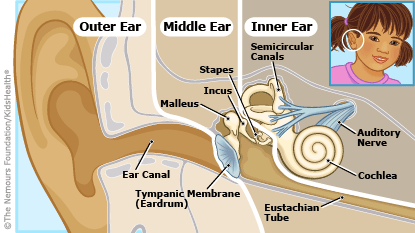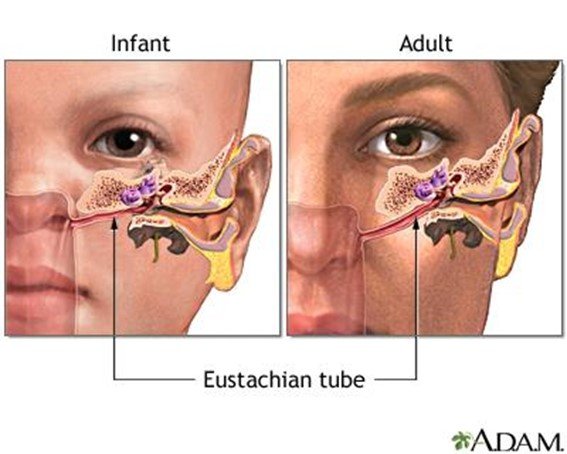Imagine watching your little one take their first steps and say their first words. It’s a magical time, but what happens when those words don’t come as expected?
If you’ve noticed your toddler isn’t speaking as much as other children their age, you’re not alone. Many parents face this concern. One potential cause that might not be on your radar is fluid in the ear. Yes, something as simple as fluid buildup can impact your child’s ability to hear and, consequently, their ability to speak.
It might sound surprising, but this common issue can have a significant impact on your toddler’s speech development. Understanding the link between fluid in the ear and speech delay can empower you to take action. You’ll be able to make informed decisions and seek the right help for your child. We’ll delve into how this condition affects speech, signs to watch for, and the steps you can take to ensure your toddler’s speech develops smoothly. Stay with us to uncover crucial insights that could make all the difference in your child’s communication journey.
Causes Of Fluid In Ear
Fluid in the ear can cause toddler speech delay due to blocked sound pathways. Common reasons include ear infections, allergies, or colds. These issues often lead to fluid buildup, affecting hearing and speech development. Timely intervention can help prevent long-term communication challenges.
Fluid in the ear is a common issue for toddlers. This condition might lead to speech delays. Understanding the causes can help in addressing the problem. Here are some common reasons why fluid accumulates in a toddler’s ear:
Ear Infections
Ear infections are a frequent cause of fluid in the ear. Bacteria or viruses can infect the middle ear. This leads to inflammation and fluid buildup. Toddlers are especially prone to these infections. Their immune systems are still developing. Ear infections can disrupt hearing, affecting speech development.
Eustachian Tube Dysfunction
Eustachian tube dysfunction is another cause of ear fluid. These tubes connect the middle ear to the throat. In toddlers, they are shorter and more horizontal. This makes it easier for fluid to become trapped. When they don’t work well, fluid builds up in the ear. This can impact hearing and speech clarity.
Allergies And Sinus Problems
Allergies and sinus issues can lead to ear fluid. Allergens cause inflammation in nasal passages. This can affect the Eustachian tubes. When these tubes are blocked, fluid accumulates. Sinus congestion worsens the problem. This may lead to temporary hearing loss in toddlers. Speech development can be hindered as a result.

Credit: www.speechbuddy.com
Impact On Speech Development
Fluid in the ear can significantly impact a toddler’s speech development. This condition, known as otitis media, affects hearing, which is crucial for learning how to speak. When a toddler’s hearing is compromised, their ability to mimic sounds and words is hindered, leading to potential speech delays. Understanding these impacts can help you take timely action to support your child’s development.
Hearing Loss Implications
A toddler’s world is full of new sounds that shape their understanding and communication skills. Fluid in the ear can dull these sounds, causing hearing loss. Imagine trying to learn a new language while wearing earplugs. You miss crucial sounds and struggle to recognize words. This is what your toddler may experience. Early detection and treatment are vital to prevent prolonged hearing issues. Regular hearing checks can make a difference.
Delayed Speech Milestones
Toddlers typically reach speech milestones like babbling, forming words, and eventually speaking in sentences. Fluid in the ear can delay these milestones. Picture a toddler trying to say “mama” but only hearing “ma.” This confusion can slow their progress. You might notice fewer words or unclear speech. Encouragement and patience are key. Engaging in simple conversations and reading can boost their language skills.
Social And Emotional Effects
Speech delays affect more than communication. They can have social and emotional repercussions. Imagine your child wanting to play but struggling to express themselves. This can lead to frustration and isolation. How can you support them? Encourage interaction with peers and provide a nurturing environment. Use gestures and expressions to aid understanding. Your support can foster confidence and help them overcome these barriers.
Fluid in the ear is more than a medical issue; it touches various aspects of your toddler’s life. As you navigate this challenge, consider how hearing, speech, and social interactions intertwine. What steps can you take today to address these impacts? Your proactive approach can pave the way for your child’s successful speech development.
Diagnosing Fluid In Ear
Fluid in a toddler’s ear can affect their speech. Early diagnosis is important. It helps in managing the condition effectively. Understanding signs and symptoms is the first step. Medical evaluations provide further insights. Hearing tests confirm the presence of fluid. Each step is crucial for a proper diagnosis.
Signs And Symptoms
Watch for frequent ear pulling. Toddlers might show irritability. Hearing difficulties may occur. Speech delays are common. Some toddlers experience balance issues. Look for these signs regularly.
Medical Evaluations
A pediatrician examines the toddler’s ears. They use an otoscope. This tool checks for fluid behind the eardrum. Medical history is reviewed. Parents provide details about symptoms. A thorough examination is key.
Hearing Tests
Hearing tests assess the toddler’s hearing ability. Audiologists conduct these tests. They determine if fluid affects hearing. Results guide treatment decisions. Early intervention helps improve speech. Regular follow-ups are often recommended.

Credit: www.northstarslpc.com
Solutions And Treatments
Fluid in the ear can lead to speech delay in toddlers. Identifying effective solutions is crucial for parents. Understanding the range of treatments can help address this issue. Let’s explore some reliable options.
Medical Interventions
Doctors often prescribe medications to treat fluid in the ear. Antibiotics help clear infections that may cause fluid buildup. Decongestants can also reduce swelling in the ear. Regular medical check-ups ensure proper monitoring of the condition.
Surgical Options
In some cases, doctors may suggest surgical intervention. Ear tube surgery is a common procedure. It helps drain fluid and prevent further buildup. This surgery is quick and done under general anesthesia. It often provides immediate relief for affected toddlers.
Home Remedies
Some parents opt for natural remedies to alleviate symptoms. Warm compresses can ease discomfort in the ear. Keeping the toddler hydrated helps thin the mucus. Elevating the child’s head during sleep can promote fluid drainage. These simple steps can provide comfort alongside medical treatments.
Speech Therapy Approaches
Speech therapy can greatly aid toddlers with fluid in the ear. It focuses on enhancing their communication skills despite hearing challenges. Therapists use various methods to encourage speech development. These approaches are tailored to each child’s unique needs.
Individualized Therapy Plans
Every toddler is different. Speech therapists create personalized plans. These plans address specific speech and language issues. They assess each child’s abilities and challenges. The therapy targets areas that need improvement. This ensures effective progress. The child feels supported and understood.
Parent Involvement
Parents play a key role in speech therapy. They are encouraged to participate. Therapists guide parents on activities to do at home. This reinforces learning. It also strengthens the parent-child bond. Consistent practice at home boosts the child’s confidence. Parents become partners in their child’s progress.
Progress Monitoring
Regular monitoring tracks the child’s improvement. Therapists adjust plans based on progress. They use assessments to measure speech development. Parents receive updates on their child’s progress. This helps in maintaining motivation. It ensures therapy remains effective and relevant.
Preventive Measures
Fluid in the ear can lead to speech delay in toddlers. Preventive measures are crucial to tackle this issue early. By adopting healthy habits and regular check-ups, parents can help their children. Early intervention strategies also play a vital role. Let’s explore these approaches in detail.
Healthy Habits
Encouraging healthy habits can prevent fluid buildup in a toddler’s ear. Ensure your child drinks plenty of water. Proper hydration keeps the body balanced. A nutritious diet supports overall ear health. Avoid exposure to secondhand smoke. Smoke can irritate the ear passages. Teach your child to wash their hands regularly. This reduces the risk of infections. Avoid loud noises that could harm their ears.
Regular Check-ups
Regular check-ups help detect any ear issues early. Visit the pediatrician for routine ear exams. These check-ups ensure the ears are healthy. If your child shows signs of discomfort, schedule a visit immediately. Early detection prevents complications. Discuss any concerns with the doctor. This ensures a proactive approach to ear health. Maintain a record of your child’s ear health history.
Early Intervention Strategies
Early intervention can prevent long-term speech delays. If fluid is found, discuss treatment options. Treatments vary based on the child’s condition. In some cases, ear tubes may be necessary. Speech therapy can also be beneficial. It helps develop language skills alongside medical treatments. Engage your child in activities that promote speech. Read books and encourage conversation daily.

Credit: www.entspecialist.sg
Frequently Asked Questions
Can Fluid In One Ear Cause Speech Delay?
Fluid in one ear can impact hearing, potentially leading to speech delay in children. Early intervention is crucial. Consult a healthcare professional if concerned. Regular check-ups ensure timely treatment and support. Addressing ear fluid issues can aid in normal speech development.
How Long After Ear Tubes Will Speech Improve?
Speech improvement can begin within weeks after ear tubes are placed. Each child’s progress varies, influenced by individual factors. Consistent follow-ups with healthcare professionals ensure optimal recovery and development. Parents should monitor and support their child’s speech journey.
Can Ear Infections Cause Speech Delay In Toddlers?
Ear infections can lead to temporary hearing issues in toddlers. These hearing problems might contribute to speech delays. Prompt treatment and monitoring are crucial to prevent long-term effects. Consult a pediatrician if you notice any speech or hearing concerns in your child.
Can Ent Help With Speech Delay?
Yes, an ENT specialist can help with speech delay. They identify and treat issues like hearing loss, which may affect speech. Early intervention can significantly improve outcomes for speech development. Always consult an ENT if you suspect hearing issues impacting speech.
Conclusion
Addressing fluid in a toddler’s ear is crucial for their speech. Early intervention makes a big difference. Consult a pediatrician for an accurate diagnosis. They can guide you through effective treatments. Look for signs of improvement over time. Parents play an important role in monitoring progress.
Supporting your child’s speech development is key. Encourage them with simple words and phrases. Positive reinforcement helps build confidence. Stay patient and attentive to their needs. Your efforts can lead to significant improvements. Always prioritize their well-being and development.

